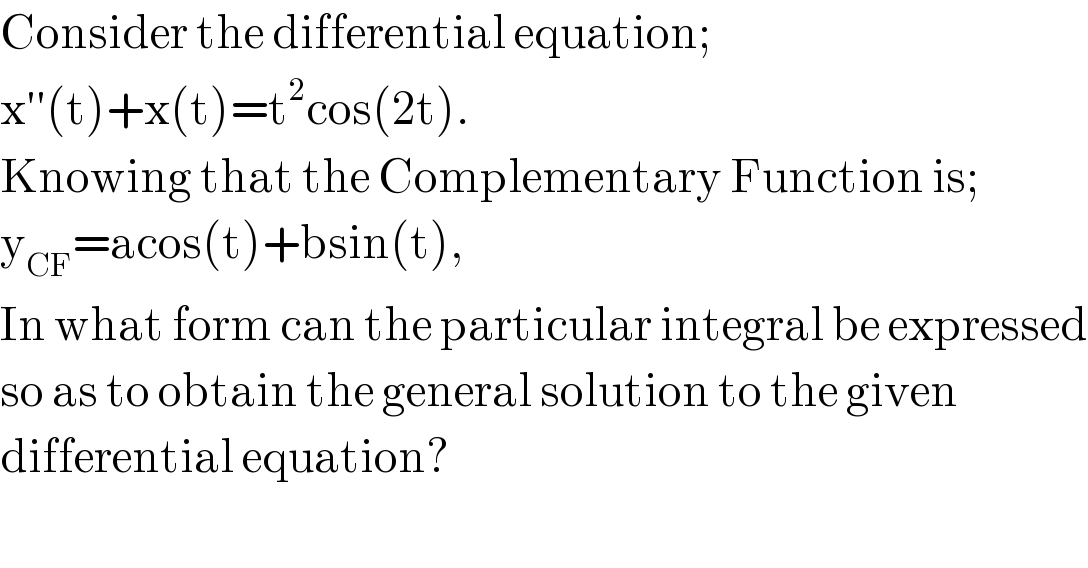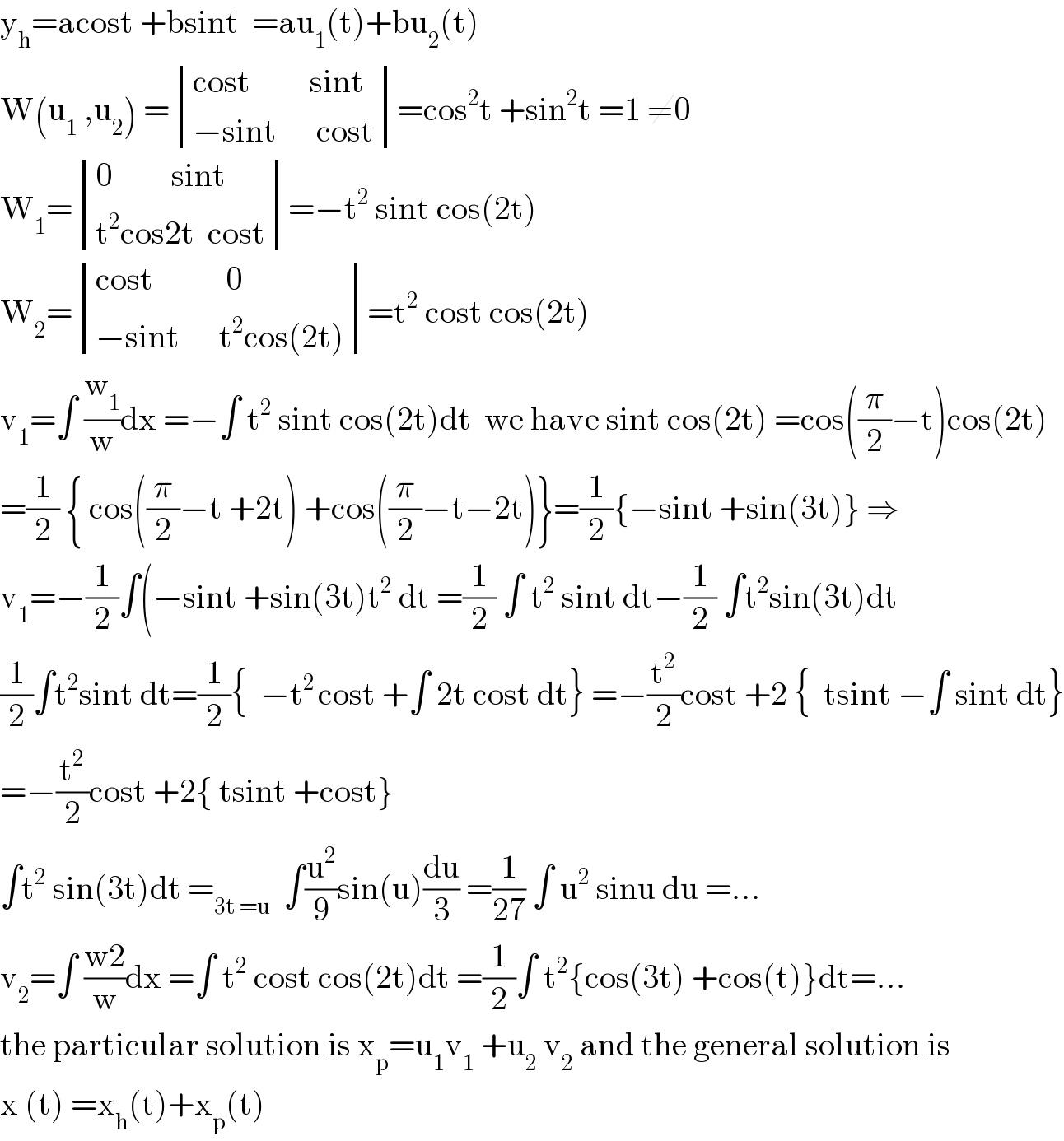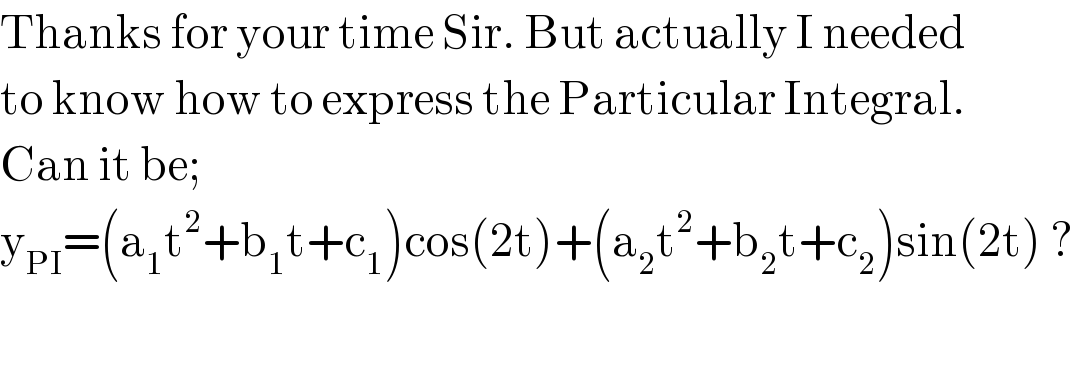
Previous in Differential Equation Next in Differential Equation
Question Number 104651 by Ar Brandon last updated on 23/Jul/20

$$\mathrm{Consider}\:\mathrm{the}\:\mathrm{differential}\:\mathrm{equation}; \\ $$$$\mathrm{x}''\left(\mathrm{t}\right)+\mathrm{x}\left(\mathrm{t}\right)=\mathrm{t}^{\mathrm{2}} \mathrm{cos}\left(\mathrm{2t}\right). \\ $$$$\mathrm{Knowing}\:\mathrm{that}\:\mathrm{the}\:\mathrm{Complementary}\:\mathrm{Function}\:\mathrm{is}; \\ $$$$\mathrm{y}_{\mathrm{CF}} =\mathrm{acos}\left(\mathrm{t}\right)+\mathrm{bsin}\left(\mathrm{t}\right), \\ $$$$\mathrm{In}\:\mathrm{what}\:\mathrm{form}\:\mathrm{can}\:\mathrm{the}\:\mathrm{particular}\:\mathrm{integral}\:\mathrm{be}\:\mathrm{expressed} \\ $$$$\mathrm{so}\:\mathrm{as}\:\mathrm{to}\:\mathrm{obtain}\:\mathrm{the}\:\mathrm{general}\:\mathrm{solution}\:\mathrm{to}\:\mathrm{the}\:\mathrm{given}\: \\ $$$$\mathrm{differential}\:\mathrm{equation}? \\ $$
Answered by mathmax by abdo last updated on 23/Jul/20

$$\mathrm{y}_{\mathrm{h}} =\mathrm{acost}\:+\mathrm{bsint}\:\:=\mathrm{au}_{\mathrm{1}} \left(\mathrm{t}\right)+\mathrm{bu}_{\mathrm{2}} \left(\mathrm{t}\right) \\ $$$$\mathrm{W}\left(\mathrm{u}_{\mathrm{1}} \:,\mathrm{u}_{\mathrm{2}} \right)\:=\begin{vmatrix}{\mathrm{cost}\:\:\:\:\:\:\:\:\:\mathrm{sint}}\\{−\mathrm{sint}\:\:\:\:\:\:\mathrm{cost}}\end{vmatrix}=\mathrm{cos}^{\mathrm{2}} \mathrm{t}\:+\mathrm{sin}^{\mathrm{2}} \mathrm{t}\:=\mathrm{1}\:\neq\mathrm{0} \\ $$$$\mathrm{W}_{\mathrm{1}} =\begin{vmatrix}{\mathrm{0}\:\:\:\:\:\:\:\:\:\mathrm{sint}}\\{\mathrm{t}^{\mathrm{2}} \mathrm{cos2t}\:\:\mathrm{cost}}\end{vmatrix}=−\mathrm{t}^{\mathrm{2}} \:\mathrm{sint}\:\mathrm{cos}\left(\mathrm{2t}\right) \\ $$$$\mathrm{W}_{\mathrm{2}} =\begin{vmatrix}{\mathrm{cost}\:\:\:\:\:\:\:\:\:\:\:\mathrm{0}}\\{−\mathrm{sint}\:\:\:\:\:\:\mathrm{t}^{\mathrm{2}} \mathrm{cos}\left(\mathrm{2t}\right)}\end{vmatrix}=\mathrm{t}^{\mathrm{2}} \:\mathrm{cost}\:\mathrm{cos}\left(\mathrm{2t}\right) \\ $$$$\mathrm{v}_{\mathrm{1}} =\int\:\frac{\mathrm{w}_{\mathrm{1}} }{\mathrm{w}}\mathrm{dx}\:=−\int\:\mathrm{t}^{\mathrm{2}} \:\mathrm{sint}\:\mathrm{cos}\left(\mathrm{2t}\right)\mathrm{dt}\:\:\mathrm{we}\:\mathrm{have}\:\mathrm{sint}\:\mathrm{cos}\left(\mathrm{2t}\right)\:=\mathrm{cos}\left(\frac{\pi}{\mathrm{2}}−\mathrm{t}\right)\mathrm{cos}\left(\mathrm{2t}\right) \\ $$$$=\frac{\mathrm{1}}{\mathrm{2}}\:\left\{\:\mathrm{cos}\left(\frac{\pi}{\mathrm{2}}−\mathrm{t}\:+\mathrm{2t}\right)\:+\mathrm{cos}\left(\frac{\pi}{\mathrm{2}}−\mathrm{t}−\mathrm{2t}\right)\right\}=\frac{\mathrm{1}}{\mathrm{2}}\left\{−\mathrm{sint}\:+\mathrm{sin}\left(\mathrm{3t}\right)\right\}\:\Rightarrow \\ $$$$\mathrm{v}_{\mathrm{1}} =−\frac{\mathrm{1}}{\mathrm{2}}\int\left(−\mathrm{sint}\:+\mathrm{sin}\left(\mathrm{3t}\right)\mathrm{t}^{\mathrm{2}} \:\mathrm{dt}\:=\frac{\mathrm{1}}{\mathrm{2}}\:\int\:\mathrm{t}^{\mathrm{2}} \:\mathrm{sint}\:\mathrm{dt}−\frac{\mathrm{1}}{\mathrm{2}}\:\int\mathrm{t}^{\mathrm{2}} \mathrm{sin}\left(\mathrm{3t}\right)\mathrm{dt}\right. \\ $$$$\frac{\mathrm{1}}{\mathrm{2}}\int\mathrm{t}^{\mathrm{2}} \mathrm{sint}\:\mathrm{dt}=\frac{\mathrm{1}}{\mathrm{2}}\left\{\:\:−\mathrm{t}^{\mathrm{2}\:} \mathrm{cost}\:+\int\:\mathrm{2t}\:\mathrm{cost}\:\mathrm{dt}\right\}\:=−\frac{\mathrm{t}^{\mathrm{2}} }{\mathrm{2}}\mathrm{cost}\:+\mathrm{2}\:\left\{\:\:\mathrm{tsint}\:−\int\:\mathrm{sint}\:\mathrm{dt}\right\} \\ $$$$=−\frac{\mathrm{t}^{\mathrm{2}} }{\mathrm{2}}\mathrm{cost}\:+\mathrm{2}\left\{\:\mathrm{tsint}\:+\mathrm{cost}\right\} \\ $$$$\int\mathrm{t}^{\mathrm{2}} \:\mathrm{sin}\left(\mathrm{3t}\right)\mathrm{dt}\:=_{\mathrm{3t}\:=\mathrm{u}} \:\:\int\frac{\mathrm{u}^{\mathrm{2}} }{\mathrm{9}}\mathrm{sin}\left(\mathrm{u}\right)\frac{\mathrm{du}}{\mathrm{3}}\:=\frac{\mathrm{1}}{\mathrm{27}}\:\int\:\mathrm{u}^{\mathrm{2}} \:\mathrm{sinu}\:\mathrm{du}\:=... \\ $$$$\mathrm{v}_{\mathrm{2}} =\int\:\frac{\mathrm{w2}}{\mathrm{w}}\mathrm{dx}\:=\int\:\mathrm{t}^{\mathrm{2}} \:\mathrm{cost}\:\mathrm{cos}\left(\mathrm{2t}\right)\mathrm{dt}\:=\frac{\mathrm{1}}{\mathrm{2}}\int\:\mathrm{t}^{\mathrm{2}} \left\{\mathrm{cos}\left(\mathrm{3t}\right)\:+\mathrm{cos}\left(\mathrm{t}\right)\right\}\mathrm{dt}=... \\ $$$$\mathrm{the}\:\mathrm{particular}\:\mathrm{solution}\:\mathrm{is}\:\mathrm{x}_{\mathrm{p}} =\mathrm{u}_{\mathrm{1}} \mathrm{v}_{\mathrm{1}} \:+\mathrm{u}_{\mathrm{2}} \:\mathrm{v}_{\mathrm{2}} \:\mathrm{and}\:\mathrm{the}\:\mathrm{general}\:\mathrm{solution}\:\mathrm{is} \\ $$$$\mathrm{x}\:\left(\mathrm{t}\right)\:=\mathrm{x}_{\mathrm{h}} \left(\mathrm{t}\right)+\mathrm{x}_{\mathrm{p}} \left(\mathrm{t}\right) \\ $$
Commented by Ar Brandon last updated on 23/Jul/20

$$\mathrm{Thanks}\:\mathrm{for}\:\mathrm{your}\:\mathrm{time}\:\mathrm{Sir}.\:\mathrm{But}\:\mathrm{actually}\:\mathrm{I}\:\mathrm{needed} \\ $$$$\mathrm{to}\:\mathrm{know}\:\mathrm{how}\:\mathrm{to}\:\mathrm{express}\:\mathrm{the}\:\mathrm{Particular}\:\mathrm{Integral}. \\ $$$$\mathrm{Can}\:\mathrm{it}\:\mathrm{be}; \\ $$$$\mathrm{y}_{\mathrm{PI}} =\left(\mathrm{a}_{\mathrm{1}} \mathrm{t}^{\mathrm{2}} +\mathrm{b}_{\mathrm{1}} \mathrm{t}+\mathrm{c}_{\mathrm{1}} \right)\mathrm{cos}\left(\mathrm{2t}\right)+\left(\mathrm{a}_{\mathrm{2}} \mathrm{t}^{\mathrm{2}} +\mathrm{b}_{\mathrm{2}} \mathrm{t}+\mathrm{c}_{\mathrm{2}} \right)\mathrm{sin}\left(\mathrm{2t}\right)\:? \\ $$$$ \\ $$
